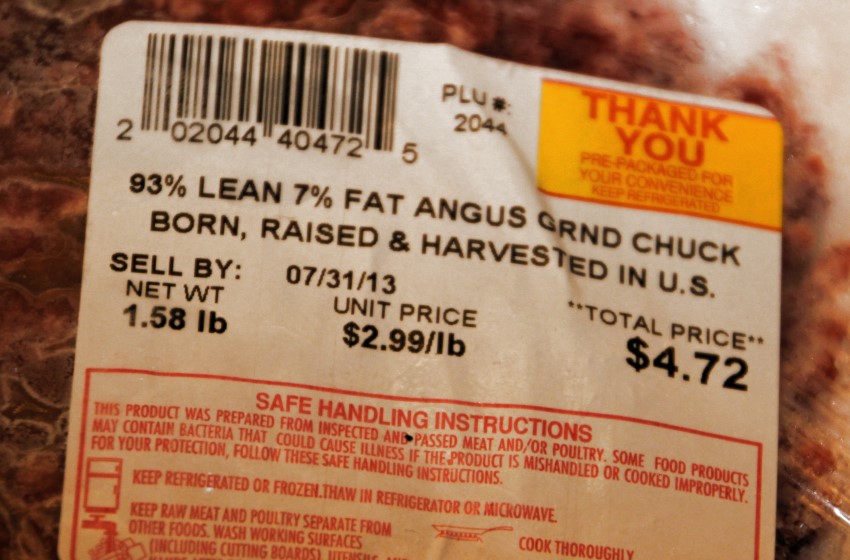
Agricultural News
Op-Ed: Outright Repeal of COOL Defies Consumer Sentiment
Tue, 07 Jul 2015 15:54:03 CDT

Policy Pennings by Harwood D. Schaffer is a Research Assistant Professor in the Agricultural Policy Analysis Center, Institute of Agriculture, University of Tennessee. Daryll E. Ray is Emeritus Professor, Institute of Agriculture, University of Tennessee, and is the former Director of the Agricultural Policy Analysis Center (APAC).
The fate of the US COOL (Country of Origin Labeling) program for beef, pork, and poultry hangs in the balance as Congress goes on its Independence Day recess. Given the May 18, 2015 WTO (World Trade Organization) ruling against COOL; the threat of $3 billion in retaliatory tariffs being imposed on US products by Canada and Mexico; and the opposition of meatpackers, food processors, the North American Meat Institute, and prominent cattle and agricultural groups; the House voted 300-131 on June 10, 2015 to repeal COOL.
In advance of the House vote on COOL, "283 farm, rural, faith, environmental, labor, farmworker, manufacturer, and consumer organizations" sent a letter to the House Agricultural Committee Chair and Ranking Member urging them to "reject the repeal of the Country-of-Origin Labeling (COOL) law and support commonsense food labeling" (http://tinyurl.com/o9yfdt3). They argued that polling reveals that 9 out of 10 Americans support COOL.
In the Senate, Pat Roberts sees repeal of COOL as the surest way to protect the US against the retaliatory tariffs. At the same time Roberts indicates that he is willing to look at alternatives. One of those alternatives, voluntary COOL, has been proposed by Senator Stabenow.
It is interesting to us that one of the groups most vocal in its opposition to COOL is the meatpacking industry, given that they are in a position to sabotage the law and make sure that it has a negative impact on livestock producers in Canada and Mexico. It has been alleged that packers have limited the processing of imported animals to certain days in order to make it easier to segregate born, raised, and processed in the US beef from imported animals that would require a label saying, born and raised in Canada and processed in the US.
Given the fact that livestock owners are paid on the basis of grade and yield, it is clear that packers have the capability to track each animal through the process. So how much more difficult could it be for their computers to also record the place of birth, raising, and slaughter in the same data record that they use to pay the producer?
Yes, different cuts of meat may go down different lines in the plant, but how hard can it be to attach a computer generated tag to each intact cut? At the end of the line, intact cuts requiring the same COOL label could then be boxed together so there is no confusion when the meat reaches the retailer. For supermarkets that receive prepackaged meat cuts, the work would even be easier; they could be labeled by the packer using data from the computer generated tag.
In the letter from the 283 groups supporting COOL, they argue that is was not COOL, "but the economic recession was the driving factor behind declining livestock imports." They went on to say "Cattle imports are higher today than when COOL went into effect and hog imports are rapidly rebounding, even with COOL in place. This straightforward logic is buttressed by a recent economic report from Auburn University that demonstrates that COOL has not impacted the livestock trade and that any harm to our trading partners has in fact been negligible at most."
If, despite that analysis, WTO should determine that there has been some negative effect other than the economic downturn and consumer choice on Canadian and Mexican livestock as the result of COOL, it would be interesting to know how much of the alleged negative effect has been caused by decisions made by the very people who have opposed COOL from the beginning? If the negative effects being felt by Canada and Mexico are not a result of COOL itself, but the implementation of COOL by the meatpacking industry, then perhaps the Canadian and Mexican lawsuit ought to be directed at those causing the problem.
We have long argued that the food industry needs to pay increased attention to consumer preferences. And there is a growing number of consumers who want to know where and how their food is being raised. All it takes is a trip through the produce aisle to see that every apple, pear, bell pepper, tomato, and- has a little sticker on it telling consumers the variety and where it was produced in some cases it lists the farm on which the item was produced. For those buying local that is an important bit of information.
To the extent that major packers and processors ignore the growing consumer trend of requiring more exacting information about food products, the greater are the opportunities for a myriad of small local/regional operators willing to tell consumers where the meat they are selling was born, raised, and slaughtered.
WebReadyTM Powered by WireReady® NSI
Top Agricultural News
More Headlines...




















